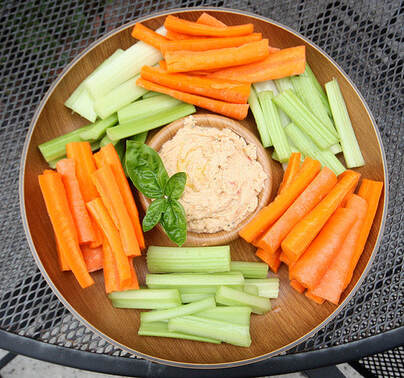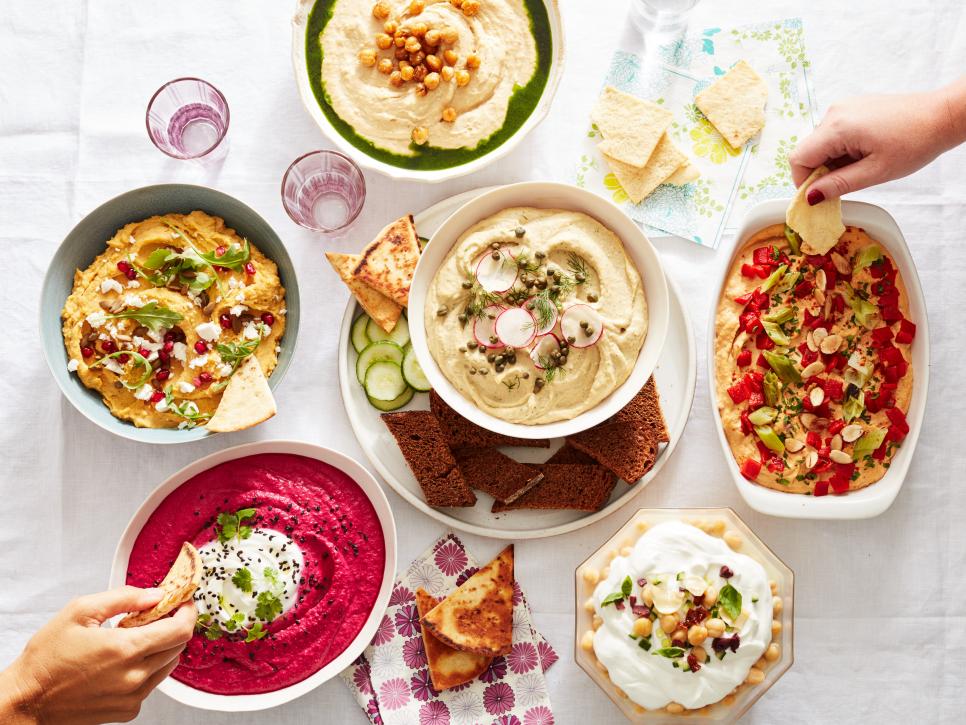 Veggies with Hummus Dip Makes a Perfect Evening Snack Veggies with Hummus Dip Makes a Perfect Evening Snack A few years back there weren’t enough people who knew to pronounce the word ‘hummus’ but now even local shops sell different varieties of this chickpea-based dip. Chickpea has been used authentically by Indians to make Chole masala or as a pulse in Sambar but now we make dips and spreads using it in the comforts of our own homes. Do you know that this dip is a favorite of many kids? One of my friends makes batches of these at home and quickly sets up a healthy snack by spreading it over bread or simply gives it as a side dip for crisps. Of course, you need the patience and perseverance to prepare it at home however simple the recipe might be when there are innumerable stores outside loading up on different varieties of hummus for sale. It might never be as popular as salsa but the last couple of decades has seen an enormous increase in the consumption of hummus comparatively. In the USA, sale of hummus has seen a gargantuan growth from less than $10 million to around $700-$800 million as almost 50% of the American population purchased this product in the last few years. Touted to be an ethnic delicacy long back in the West, Britain now gets more than 12,000 tons of hummus every year and it has grown from a $5 million industry to $325 million industry in the past two decades in the USA (https://www.bbc.com/news/magazine-15148342). This Middle East discovery has gone over to rule the world owing to its different attractive features such as being a rich source of protein and a gluten-free product. But despite its benefits, the addition of oils makes one always wonder if hummus is as good as it has been projected to be or whether it’s yet another ingredient that provides satiety to taste buds only. A Blend of Interesting Ingredients Traditional hummus is made from a blend of chickpeas, olive oil, tahini (sesame paste), lemon juice and spices which contribute to a nutrient-dense end-product that’s rich in vitamins, minerals, calcium, folate and magnesium compared to other dips and spreads. Firstly, chickpea, the main ingredient in hummus, contributes mainly towards this dish’s maximized health. Also known as garbanzo beans, they belong to a class of legumes called as pulses which occupy one of the highest places in the list of healthy foods for their rich availability of B vitamins, calcium, folic acid, iron, magnesium, phosphate, potassium and zinc. Chickpeas are also excellent sources of fiber and protein where 2 tablespoons of hummus contain two grams of protein and one gram of fiber. But this is never sufficient to fulfill daily fiber requirements as each of us need about 50 g of protein per day and 25 g (women)/38 g (men) of fiber based on your gender. Such nutritional combinations offer protection against heart disease and stabilizes blood sugar levels. Hummus is the house to a rich combination of all three macronutrients that help in keeping a person full and satisfied. Even a study reported in a reputed journal found that individuals who consumed any amount of chickpea, hummus or both had markers for better health compared to those who don’t eat any of these. These individuals also had smaller waist and lower body mass index. Besides, traditional preparation of hummus adds healthy fats to the body owing to the use of olive oils that’s rich in heart-healthy monounsaturated fats. But not all types of hummus are equal and there is significant difference between the home-prepared and store-purchased ones. There are innumerable options to choose from-roasted red peppers, beetroot hummus, quinoa hummus, peanut butter, pizza, chocolate flavored, wasabi, curry or caramelized onion. But such commercially manufactured hummus might increase your totally calorie intake as it could be rich in oils and sugar. There are also a couple of brands that shower generous quantities of sodium with as much as 80 mg, 3 grams of fat and 50 calories for a 2-tablespoon serving. Your tub of hummus might be over even before you realize it and one must be extremely careful while handling portion sizes. Read the ingredient list and choose those varieties that resemble the ingredients used in traditional recipe while avoiding those that contain other types of oils, sugar and preservatives. Hummus is actually higher in calories than some other dips and at the same time, it is also healthier comparatively. Enjoy a dollop of hummus with veggies such as carrots or celery sticks, spread them over pita chips or bread or pair them with anything of your choice to get a taste of all the nutrients that many vegans and vegetarians lack generally. Hummus is good for health when you eat one that’s not filled with extra sugar or oil. In short, preparing your own hummus at home is an excellent option but how many of you are ready to spend time doing it? That’s the biggest question here! References Is Hummus Good for You? https://www.consumerreports.org/nutrition-healthy-eating/is-hummus-good-for-you/ Is Hummus Actually Healthy? Here’s What the Experts Say: https://time.com/5331376/is-hummus-actually-healthy-heres-what-the-experts-say/ Your Hummus Habit Could be Good for the Earth: https://www.mprnews.org/story/2019/07/10/npr-your-hummus-habit-could-be-good-for-the-earth Is Hummus Healthy or Not? https://www.independent.co.uk/life-style/food-and-drink/hummus-is-it-healthy-fat-good-for-you-vegan-protein-calories-weight-loss-a8335896.html Comments are closed.
|
AVOID FRAUD. EAT SMART.+91 7846 800 800
AuthorDietitian & Nutritionist Dr. Nafeesa Imteyaz. Archives
November 2022
Categories
All
Dr. Nafeesa's Blog @blogspot |
- Home
- Written Testimonials
- Consult
- Clinics
- Blogs
-
Diet & Nutrition
- Diabetes Reversal
- IVF IUI not needed for PCOS PCOD Infertility
-
Medical Nutrition
>
-
Disease & Conditions
>
- Infertility | PCOS
- Diabetes Mellitus
- Cholesterol
- Hypothyroid
- Kidney Problems
- Hypertension
- Cardiovascular Diseases
- Liver Diseases
- Gastro intestinal disorder
- Cancer
- Metabolic Disorders
- Orthopedic Disorders
- Eating Disorders
- Dietary Recall
- Weight Record Filled By Clients
- Online Payment Transaction Details
- Online Clients Weight Check Form
- Our Program Package Service Charges
- Weight Record 2017 Clients
- Measurements sent by Clients
- Terms & Conditions Of Payment
- Thanks. Your Form is Submitted
- Video Testimonials
- Lifestyle & Wellness
- Lifestyle & Wellness Blog
- Allergy & Intolerance
- Weight Loss / Gain
- Weight Loss / Slimming Blog
-
Disease & Conditions
>
- Life Cycle Nutrition >
- Sports Nutrition >
- Integrity in Nutrition
- Knowledge Centre
© COPYRIGHT 2022. ALL RIGHTS RESERVED. FRST HEALTHCARE PVT LTD.
Dr. Nafeesa Imteyaz of First Eat Right clinic, is the Best Dietitian Nutritionist in Bangalore. Best Dietitian Nutritionist in Pune. Best Dietitian Nutritionist in Hyderabad. Best Dietitian Nutritionist in Chennai. Best Dietitian Nutritionist in Mumbai. Best Dietitian Nutritionist in Delhi. Best Dietitian Nutritionist in Kolkata.


